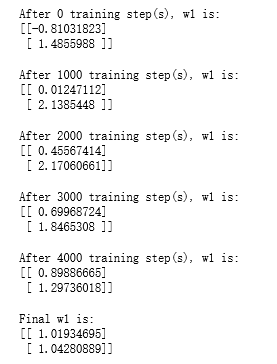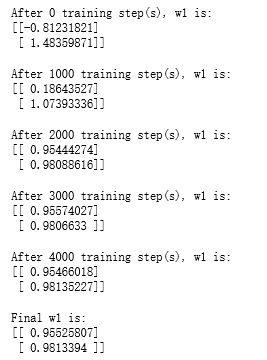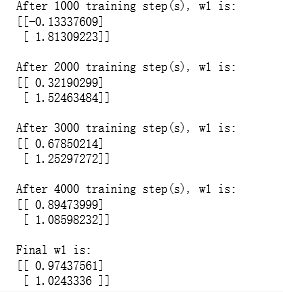import tensorflow as tf from numpy.random import RandomState batch_size = 8 x = tf.placeholder(tf.float32, shape=(None, 2), name="x-input") y_ = tf.placeholder(tf.float32, shape=(None, 1), name='y-input') w1= tf.Variable(tf.random_normal([2, 1], stddev=1, seed=1)) y = tf.matmul(x, w1) # 定义损失函数使得预测少了的损失大,于是模型应该偏向多的方向预测。 loss_less = 10 loss_more = 1 loss = tf.reduce_sum(tf.where(tf.greater(y, y_), (y - y_) * loss_more, (y_ - y) * loss_less)) train_step = tf.train.AdamOptimizer(0.001).minimize(loss) rdm = RandomState(1) X = rdm.rand(128,2) Y = [[x1+x2+(rdm.rand()/10.0-0.05)] for (x1, x2) in X] with tf.Session() as sess: init_op = tf.global_variables_initializer() sess.run(init_op) STEPS = 5000 for i in range(STEPS): start = (i*batch_size) % 128 end = (i*batch_size) % 128 + batch_size sess.run(train_step, feed_dict={x: X[start:end], y_: Y[start:end]}) if i % 1000 == 0: print("After %d training step(s), w1 is: " % (i)) print sess.run(w1), "\n" print "Final w1 is: \n", sess.run(w1)

loss_less = 1 loss_more = 10 loss = tf.reduce_sum(tf.where(tf.greater(y, y_), (y - y_) * loss_more, (y_ - y) * loss_less)) train_step = tf.train.AdamOptimizer(0.001).minimize(loss) with tf.Session() as sess: init_op = tf.global_variables_initializer() sess.run(init_op) STEPS = 5000 for i in range(STEPS): start = (i*batch_size) % 128 end = (i*batch_size) % 128 + batch_size sess.run(train_step, feed_dict={x: X[start:end], y_: Y[start:end]}) if i % 1000 == 0: print("After %d training step(s), w1 is: " % (i)) print sess.run(w1), "\n" print "Final w1 is: \n", sess.run(w1)

loss = tf.losses.mean_squared_error(y, y_) train_step = tf.train.AdamOptimizer(0.001).minimize(loss) with tf.Session() as sess: init_op = tf.global_variables_initializer() sess.run(init_op) STEPS = 5000 for i in range(STEPS): start = (i*batch_size) % 128 end = (i*batch_size) % 128 + batch_size sess.run(train_step, feed_dict={x: X[start:end], y_: Y[start:end]}) if i % 1000 == 0: print("After %d training step(s), w1 is: " % (i)) print sess.run(w1), "\n" print "Final w1 is: \n", sess.run(w1)






